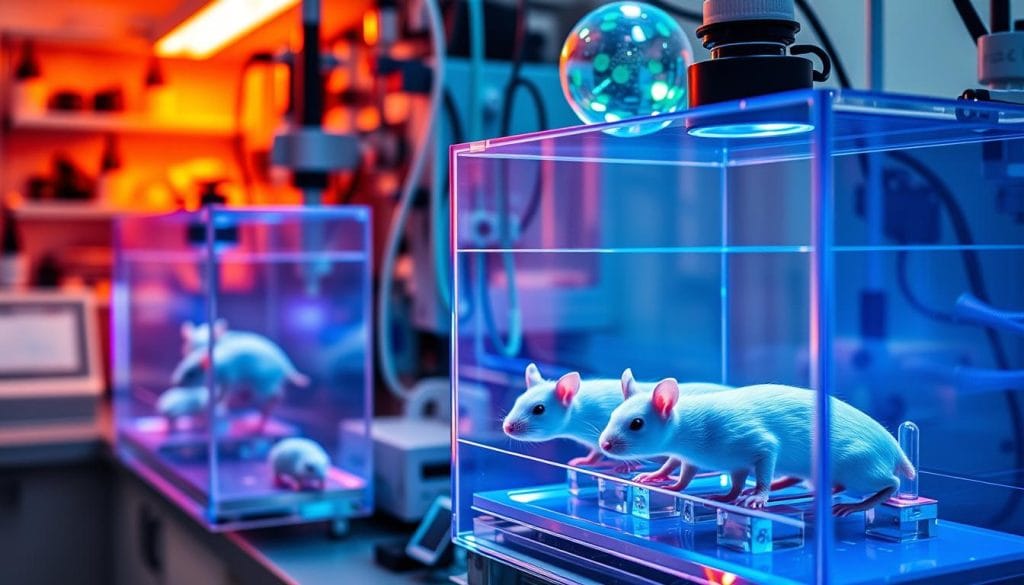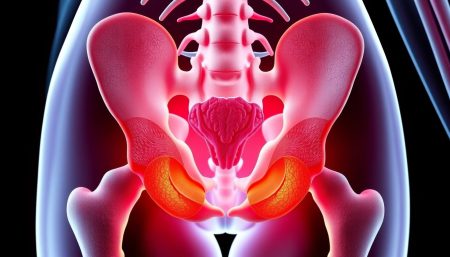The world of COVID-19 research has changed a lot with the arrival of COVID-19 humanized mice. These mice are special because they act like humans when it comes to fighting the virus. They help scientists learn how the virus works and how to fight it.
These mice are made to be like humans in how they fight off the virus. This lets scientists study the virus in a way that’s very close to how it acts in people. This is key for finding new treatments and vaccines.
Using these mice to study the virus has opened up new ways of understanding it. They are key for testing medicines and vaccines before they go to human trials. These mice are a big step forward in our fight against the virus.
Key Takeaways
- Humanized mice models are vital for accelerating COVID-19 preclinical research.
- These models replicate human immune response to SARS-CoV-2, aiding in the study of virus behavior.
- COVID-19 humanized mice are fundamental for evaluating vaccine and treatment efficacies.
- They serve as a crucial intermediary step before initiating human clinical trials.
- These animal studies substantially contribute to our understanding and management of the pandemic.
The Emergence of COVID-19 Humanized Mice in Research
The field of virus research has seen big steps forward with the development of COVID-19 humanized mice. This breakthrough came from genetically engineered COVID mice. They help scientists understand how humans react to the new coronavirus. This is a major win in coronavirus research, helping scientists worldwide.
Using COVID-19 humanized mice lets researchers study SARS-CoV-2’s effects on a human-like level. By adding human genes, proteins, or cells to mice, scientists get models that act like humans. This gives them key insights to fight this disease better.
| Feature | Importance in COVID-19 Research |
|---|---|
| Human-like immune response | Allows detailed study of virus interaction and immune evasion |
| Genetic Engineering | Enables the incorporation of human-specific targets like the ACE2 receptor |
| Application in Therapeutics | Crucial for evaluating vaccine candidates and antiviral drugs |
This new model has opened doors for understanding SARS-CoV-2 and how it might change. The COVID-19 humanized mice development is a big step forward. It helps us model human disease and response on a large scale. This directly affects how fast we can develop treatments and vaccines.
Understanding the Role of Humanized ACE2 Mice in COVID-19 Studies
Humanized ACE2 mice have changed COVID-19 research a lot. These mice have human ACE2 receptors, helping us understand SARS-CoV-2 better.
ACE2 Receptor & SARS-CoV-2 Interaction
Humanized ACE2 mice are key in studying SARS-CoV-2. They have human ACE2 receptors, letting researchers see how the virus works. This is important for finding treatments and vaccines.
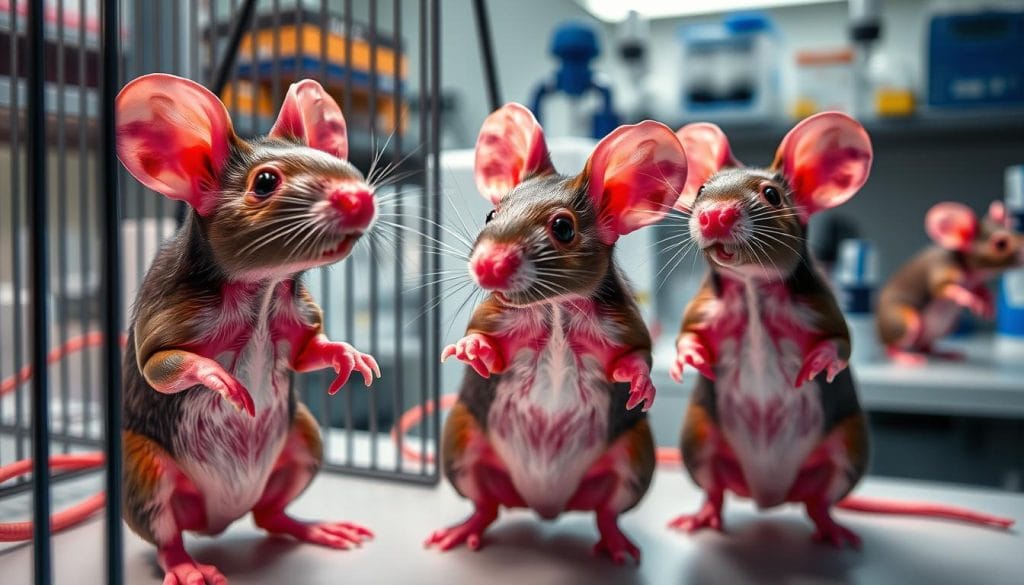
Advancements in Transgenic Mouse Models
Transgenic mouse models have evolved a lot. They mimic how humans react to SARS-CoV-2, giving us new insights. By adding the human ACE2 gene, scientists can study COVID-19 more closely.
This helps us understand the disease better and find new treatments faster. These models are essential for COVID-19 research.
These detailed models help us understand virus-host interactions. They could lead to new ways to treat and prevent COVID-19.
Genetically Engineered COVID Mice: Paving the Way for Vaccine Development
The use of genetically engineered COVID mice in COVID-19 vaccine development is groundbreaking. They give us crucial information on vaccine safety and effectiveness before human trials. These mice are key in SARS-CoV-2 animal studies, helping us see how vaccines work and any possible side effects.
- Geared towards mimicking human biological responses to SARS-CoV-2
- Allow for precise assessment of vaccine formulations
- Essential in determining dosage levels and frequency of administration
By studying these mice, scientists can improve vaccine safety and effectiveness. This speeds up vaccine development. It also makes sure vaccines work well in people.
So, genetically engineered COVID mice are crucial in fighting pandemics. They help us make better vaccines faster. This is key in keeping us safe from COVID-19.
Human-Like COVID Response in Rodents: A Crucial Study Tool
The study of human-like COVID response in rodents is key to understanding SARS-CoV-2’s effects on humans. Rodent models that mimic human responses help researchers study the virus’s behavior. They also explore how it affects different biological systems.
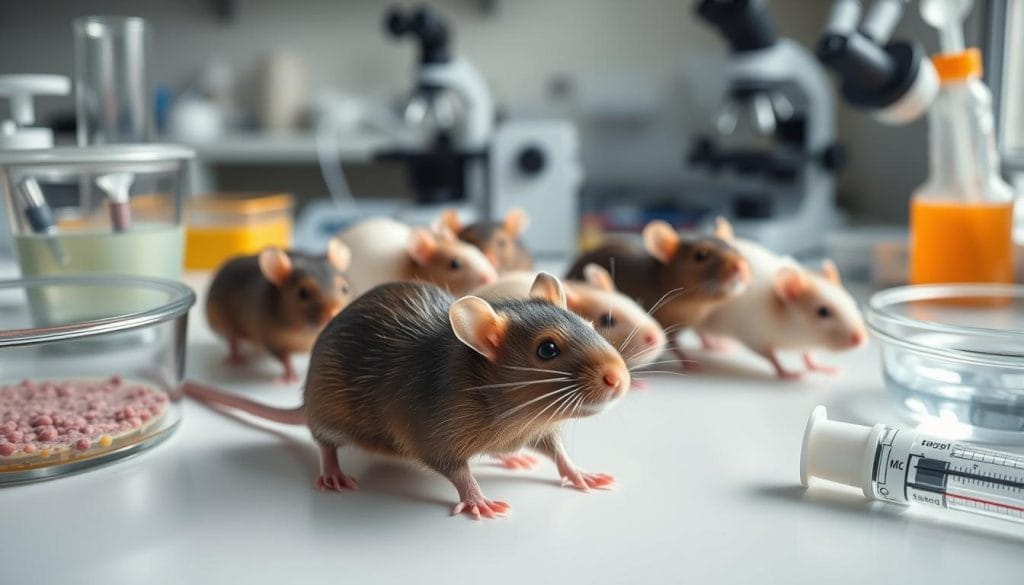
Using humanized mice, scientists have gained important immunological insights. These insights are vital for creating effective treatments and vaccines.
Immunological Insights from COVID-19 Mice
Studies with humanized rodent models have shown how the immune system reacts to the virus. They reveal why some people get sicker than others. This knowledge could help create more tailored treatments. A significant study explains how a humanized mouse for COVID-19 was developed. It replicates the immune responses seen in severe cases, aiding ongoing research.
Pathogenesis and Symptomatology Analysis
By studying COVID-19 symptomatology in rodents, researchers can track the disease’s progression. This helps them understand how the virus spreads and how the immune system responds. It guides the development of new treatments.
In summary, using rodent models that mimic human reactions to SARS-CoV-2 is crucial. These models help scientists understand the virus’s impact. By studying immunological interactions and symptomatology, researchers can better fight the pandemic.
Breaking Down COVID Pathogenesis in Humanized Mice
Studying COVID pathogenesis in humanized mice is key to understanding SARS-CoV-2’s effects on humans. These mice have human-like genes, allowing researchers to closely observe virus behavior and immune responses. This helps us better understand the disease and speeds up the creation of treatments and vaccines.
Humanized ACE2 mice studies are valuable because they mimic human responses to coronavirus. They have the human ACE2 receptor, which the virus uses to enter cells. This makes them perfect for studying viruses.
These models allow us to observe the viral replication and progression of the virus within a controlled environment, offering insights that are critical for therapeutic intervention strategies.
The advantages of coronavirus mouse models are many. They help us understand how the virus infects and how our immune system reacts. The results of these studies are vital for testing new treatments in clinical trials.
- Detailed observation of viral replication and tissue-specific responses
- Evaluation of prophylactic and therapeutic treatments
- Understanding variations in host responses to infection
As we keep making progress, we’re not just fighting the current pandemic. We’re also preparing for future outbreaks. The research on COVID pathogenesis in humanized mice gives us hope and direction. It helps us protect public health during these tough times.
SARS-CoV-2 Transgenic Mouse Models: A Deeper Dive
The creation of SARS-CoV-2 transgenic mouse models has greatly helped us understand COVID-19. These models let researchers test the efficacy of antiviral drugs in mice in ways that matter for humans. Scientists can now study the virus and treatments more accurately.
Designing SARS-CoV-2-Specific Rodent Models
Designing COVID-specific rodent models is a complex task. It involves genetic engineering to make mice act like humans when infected. This makes the mice a good model for studying the virus and how it progresses.
Evaluating the Efficacy of Antiviral Compounds
Testing treatments in these models gives us important information. It shows how well antiviral drugs work. This helps speed up the process of getting new treatments to people.
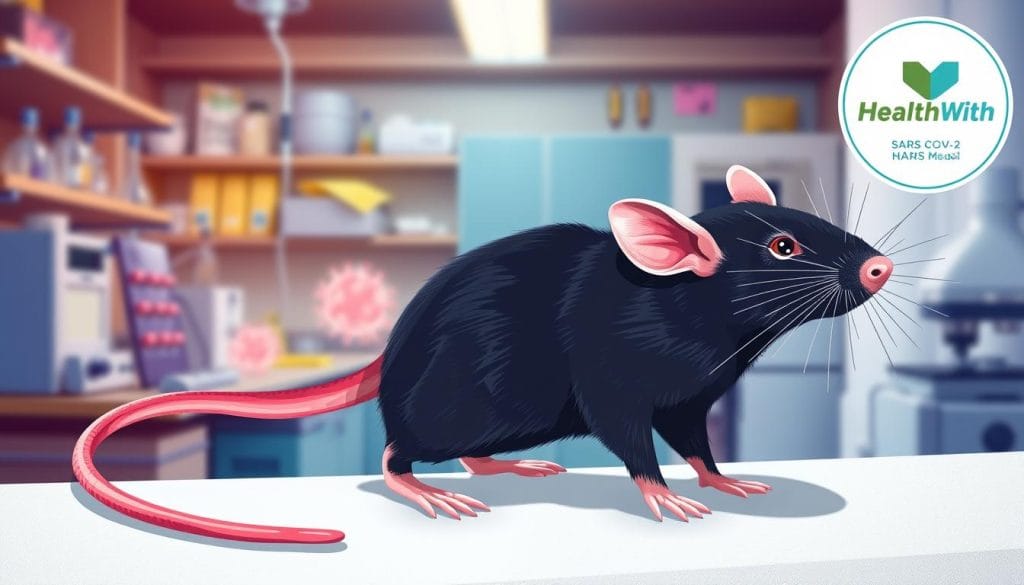
| Antiviral Drug | Tested Efficacy in SARS-CoV-2 Mice Model (%) | Notes |
|---|---|---|
| Remdesivir | 85 | Highly effective in early infection stages |
| Favipiravir | 50 | Moderate efficacy, varies with virus load |
| Molnupiravir | 62 | Effective in reducing viral replication |
The use of SARS-CoV-2 transgenic mouse models is key in research and development. It helps us understand the virus and find better treatments.
Overcoming Challenges in COVID-19 Preclinical Research
Finding effective treatments and vaccines for COVID-19 is a tough journey. Scientists use coronavirus mouse models to study the disease in a way that mirrors human cases. This part talks about the challenges in COVID research and how they’re being tackled.
One big problem is making mice that act like humans when infected with the coronavirus. This requires advanced genetic engineering and virology skills. Yet, these mouse models are key. They let researchers see how the virus acts and test treatments before they’re tried on humans.
Another big challenge is the differences between mice and humans. These differences can change how symptoms and immune responses show up in mice versus people. So, scientists keep working to make the mouse models more like humans.
| Challenge | Impact on Research | Solution |
|---|---|---|
| Genetic Engineering | High complexity and cost | Advancements in CRISPR and other gene-editing technologies |
| Species Differences | Variation in disease manifestation | Development of humanized mouse models |
| Biological Safety | High risk of contamination | Enhanced biosecurity protocols |
Overcoming these challenges in COVID research speeds up the search for treatments. It also makes COVID-19 preclinical research safer and more ethical. The work on coronavirus mouse models is vital in our fight against the pandemic.
The Contribution of Coronavirus Mouse Models to Therapeutic Discovery
Mouse models play a key role in finding COVID-19 treatments. They help connect research to real-world use. These models offer insights that move treatments from lab to clinic. They help test how well treatments work and if they are safe.
From Mice Trials to Clinical Trials
The path from mice to humans is long and detailed. Mouse models are crucial in this journey. They let researchers see how the virus and treatments act in a controlled setting. This is vital for testing before human trials.
Impact on Drug Repurposing Efforts
Testing old drugs against COVID-19 is a big area of study. Mouse models are key in this. They help figure out if these drugs work against the virus. This speeds up finding treatments, which can save lives.
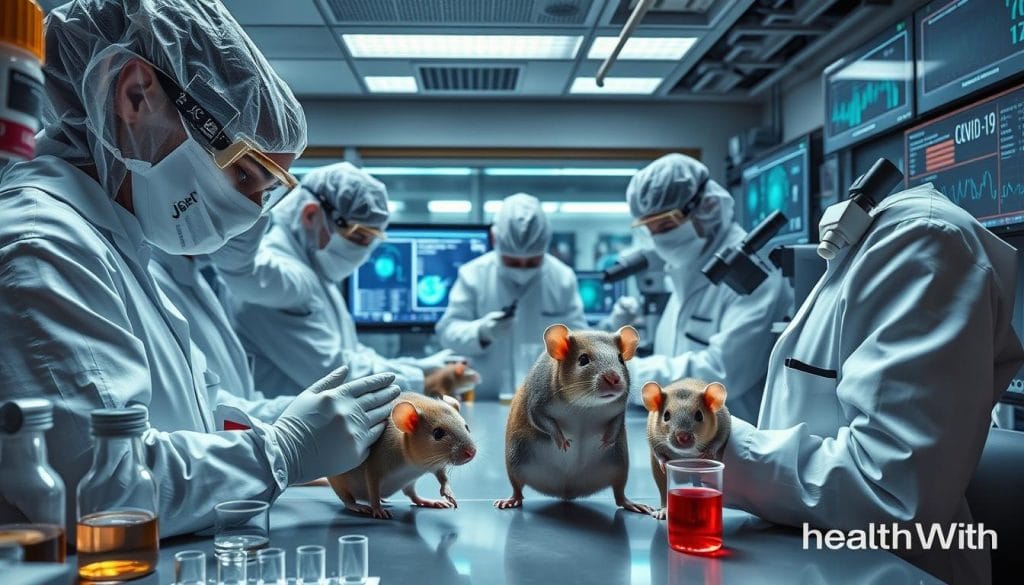
| Drug | Original Use | Repurposed for COVID-19 | Result in Mouse Model |
|---|---|---|---|
| Remdesivir | Antiviral | Yes | Reduced viral replication |
| Hydroxychloroquine | Antimalarial | Yes | Mixed outcomes |
| Dexamethasone | Anti-inflammatory | Yes | Improved survival rates |
These models do more than test treatments. They also help understand side effects and the right doses. This information is crucial for moving treatments forward in human trials.
Behind the Scenes: Creating a COVID 19 Humanized Mouse
The journey to create COVID 19 humanized mouse models is a peak of precision in genetic engineering in rodent models. It’s a detailed process that makes mice act like humans when it comes to fighting SARS-CoV-2. This helps scientists study the virus better and find new treatments.
Making mice like humans is complex. It needs advanced methods to swap mouse genes with human ones. The ACE2 receptor is key because it lets the virus get into human cells.
- Identification of Target Genes
- Design of Human Equivalent ACE2
- Embryonic Stem Cell Microinjection
- Breeding and Verification of Humanized Genes
Every step in creating COVID 19 humanized mouse is done with great care. This ensures the mice models give trustworthy data for research.
| Process | Description | Importance |
|---|---|---|
| Gene Targeting | Inserts human-like ACE2 at specific loci. | Central for initial virus-host interactions. |
| Genotyping | Confirm human gene incorporation. | Ensures validity of the model for testing. |
| Clinical Observation | Monitor health and behavior. | Assesses model’s response compared to humans. |
The success of these efforts is crucial. It’s not just about understanding COVID-19. It’s also about finding effective treatments. So, genetic engineering in rodent models is key to a future with better treatments and maybe even cures.
COVID-19 Animal Studies: Ethical Considerations and Practices
Humanized mice are key in fighting COVID-19. But, we must always think about their welfare. Important topics include COVID-19 animal study ethics, ensuring animal welfare, and balancing scientific and ethical considerations.
Ensuring Animal Welfare in Research Settings
Animal care and ethics are top priorities in COVID-19 mouse studies. Scientists work hard to treat animals with respect and care. They aim to reduce stress and meet the animals’ needs.
Balancing Scientific Needs and Ethical Responsibilities
Science needs animal studies, but ethics come first. Every COVID-19 study is reviewed for ethics. This ensures the benefits outweigh the animal use. It also looks for ways to use fewer animals and make procedures less painful.
| Ethical Principle | Implementation in COVID-19 Animal Studies |
|---|---|
| Replacement | Use of alternative methods wherever feasible to reduce animal usage |
| Reduction | Employment of techniques that require the fewest number of animals to obtain valid results |
| Refinement | Enhancement of procedures to minimize potential pain and distress |
Key Findings from Recent SARS-CoV-2 Animal Studies
The latest research has greatly improved our understanding of SARS-CoV-2 through animal studies. These studies have shown how the virus works in different biological systems. This knowledge is crucial for making better treatments and vaccines.
Recent studies have made big strides in understanding how the virus spreads and how treatments work. Most of this research was done on genetically modified rodents. It has led to new ways to make vaccines that better mimic human immune responses.
- Detailed analysis of viral behavior in response to existing antiviral drugs.
- Assessment of vaccine efficacy across different genetic strains of mice.
- Exploration of long-term immune responses to natural infection and vaccination.
These studies have given us a deeper look into the virus and how to fight it. They help scientists improve their models to better match human conditions. This is key to effectively battling the pandemic.
These findings highlight the need to use detailed genomic data and clinical features in research. They show how animal studies are vital in moving from theory to practice in the fight against COVID-19.
Advancing Our Understanding of COVID-19 Through Rodent Models
Rodent models play a key role in understanding COVID-19. They help us study how the virus and vaccines work in mice. This research gives us important insights into how humans might react to the virus and vaccines.
Looking at Infection Mechanisms
Studies with rodent models show us how SARS-CoV-2 acts in living organisms. This knowledge is vital for creating treatments and preventing the spread of the virus.
Learning from Vaccine-Induced Immune Responses
Genetically modified mice help scientists test vaccine effectiveness. By studying how vaccines work in these mice, researchers can pick the best vaccines for human trials.
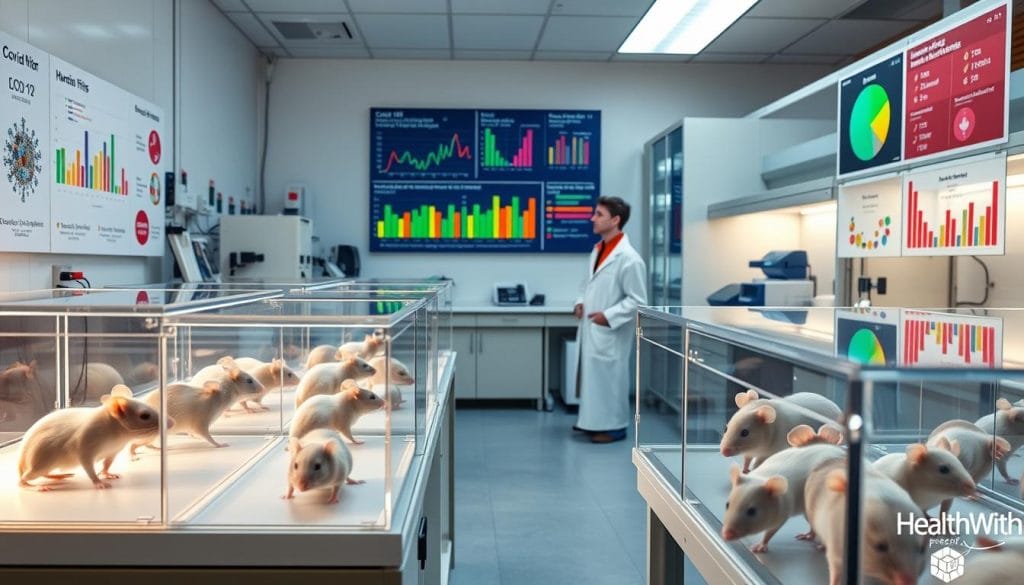
Scientists keep improving vaccine designs by analyzing mouse immune responses. This ongoing work is key to making vaccines that protect well and are safe.
So, rodent models are crucial for understanding how COVID-19 works and for making effective vaccines. Their role in research helps us prepare for future health crises.
Collaboration and Innovation: The Future of COVID-19 Mouse Research
The fight against COVID-19 relies on collaboration in COVID-19 research and innovation in SARS-CoV-2 mouse studies. This combination speeds up the development of treatments and vaccines. It also deepens our medical knowledge.
Scientific research benefits from diverse technologies and shared ideas. By working together, researchers worldwide can achieve more in COVID-19 studies.
Several initiatives show how to work together:
- Shared databases help avoid repeating work and increase transparency.
- Partnerships between schools and companies make research bigger and better.
- International groups help standardize methods, making data easier to compare.
Technological advancements are also key. Tools like CRISPR and automated systems have changed mouse model research. They let scientists work more precisely and quickly.
| Technology | Application in SARS-CoV-2 Mouse Studies | Impact on Research Outcomes |
|---|---|---|
| CRISPR/Cas9 Gene-Editing | Targeted insertion/deletion of specific genes related to COVID-19 | Enhanced model accuracy leading to better mimicking of human response to SARS-CoV-2 |
| High-throughput Screening | Rapid testing of thousands of drug compounds | Speedier identification of viable therapeutic options |
| Digital Microscopy and Imaging | Non-invasive tracking of disease progression in vivo | More in-depth analysis of pathogenic mechanisms and treatment effects |
Looking ahead, we need strong collaboration in COVID-19 research and innovation in SARS-CoV-2 mouse studies. These efforts will help us understand SARS-CoV-2 better. They also prepare us for future pandemics. So, it’s vital to keep improving research partnerships and technology.
Conclusion
The journey through COVID-19 research highlights the key role of COVID-19 humanized mice. These models give scientists a deep look into the virus. They help in making big steps in advancements in coronavirus research.
These mice are crucial for testing and improving vaccines. They help scientists find new ways to fight the virus.
The work of scientists using importance of animal models in pandemics is very important. It shows how SARS-CoV-2 affects our bodies. This knowledge is a big win for fighting health crises.
Humanized mouse models are heroes in our fight against pandemics. They give us hope and the tools to face future health challenges.
Looking back at this research, we feel hopeful. The work on COVID-19 humanized mice shows the power of teamwork and innovation. It shows the importance of keeping up the research for better health.
We look forward to new discoveries and lasting solutions. These are key to advancing medical science.
FAQ
What are COVID-19 humanized mice and why are they important for research?
COVID-19 humanized mice are special rodents with human-like responses to SARS-CoV-2. They help us understand the virus and test treatments and vaccines. This speeds up research on COVID-19.
How were COVID-19 humanized mice developed for research use?
Scientists made COVID-19 humanized mice by adding human genes to them. This makes them get infected like humans and respond like us to the virus.
What role do humanized ACE2 mice play in COVID-19 studies?
Humanized ACE2 mice are key in studying SARS-CoV-2 and the human ACE2 receptor. They help check how well drugs and vaccines work. This gives us insights into new mouse models.
How have genetically engineered COVID mice contributed to vaccine development?
Genetically engineered COVID mice help in preclinical trials. They let scientists test vaccine safety and effectiveness before human trials.
Can mice really mimic the human-like COVID response?
Yes, genetically engineered mice can act like humans when infected with SARS-CoV-2. They give us important insights into COVID-19’s effects and symptoms.
What does COVID pathogenesis in humanized mice reveal about the disease?
Studying COVID in humanized mice shows how the virus works and how the disease progresses. It’s key for finding effective treatments.
What are SARS-CoV-2 transgenic mouse models and their purpose?
SARS-CoV-2 transgenic mouse models have human proteins like the ACE2 receptor. They let us test antiviral compounds and understand the virus’s ways.
What challenges do researchers face in COVID-19 preclinical research with mouse models?
Researchers face many challenges, like making mouse models that truly mimic human disease. They also need to keep study conditions the same and understand data for humans.
How do coronavirus mouse models contribute to therapeutic discovery?
Coronavirus mouse models are crucial for testing treatments. They show how drugs work in a living body. This helps narrow down drug options before human trials.
What goes into creating a COVID-19 humanized mouse?
Making a COVID-19 humanized mouse involves complex genetic engineering. It also includes breeding, maintaining, and testing these mice for research.
What ethical considerations are involved in COVID-19 animal studies?
Ethical concerns include animal welfare and using the fewest animals needed. It’s about causing the least harm and balancing science with ethics.
What are some key findings from recent SARS-CoV-2 animal studies?
Recent studies have found important details on infection mechanisms, treatments, vaccine success, and viral variants. They’ve greatly helped us understand COVID-19.
How do rodent models advance our understanding of COVID-19?
Rodent models give us deep insights into SARS-CoV-2 infection and immune responses. They help us understand the virus and find ways to prevent and cure it.
What do collaboration and innovation contribute to the future of COVID-19 mouse research?
Collaboration and innovation drive COVID-19 mouse research. They lead to global cooperation, sharing, and new technologies. This helps us fight the pandemic better.












